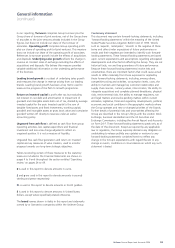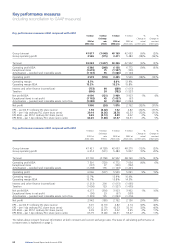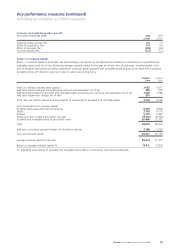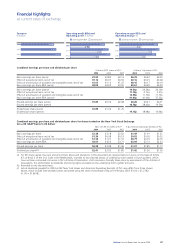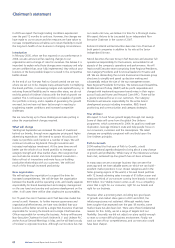Unilever 2004 Annual Report Download - page 16
Download and view the complete annual report
Please find page 16 of the 2004 Unilever annual report below. You can navigate through the pages in the report by either clicking on the pages listed below, or by using the keyword search tool below to find specific information within the annual report.Unilever Annual Report and Accounts 2004 13
About Unilever
(continued)
Setting targets and monitoring our progress against them are an
important part of our systematic approach to reduce our impact
on the environment. Detailed performance information is
published in our summary environment report and on our
website.
More than two-thirds of the raw materials used in our products
come from agriculture. This led us to develop our Sustainable
Agriculture Programme, which, together with our partners, we
are implementing across our supply chain.
In 2004, the roll-out of our Good Agricultural Practice guidelines
(GAP) for our crops gained momentum. We published guidelines
in local languages for sustainable tea production in India, Kenya
and Tanzania.
We are a founding member of the Roundtable on Sustainable
Palm Oil (RSPO), a multi-stakeholder initiative set up in 2003 with
the WWF (formerly the Worldwide Fund for Nature). The RSPO
now has 55 members and 17 affiliate members, and has
produced a draft framework document on the criteria for palm oil
sustainability.
The first steps have been taken to extend our agricultural
initiatives to all major vegetable oils, including olive, rape,
soya and sunflower.
In Europe, we now buy more than half our fish from sustainable
fisheries and expect this figure to rise to around 60% in 2005.
Although this falls short of the 100% target we set ourselves in
1996, substantial improvements have been made in difficult
circumstances, such as the unforeseen length of the certification
process. We continue to engage with fisheries that have not yet
fully adopted the disciplines of sustainable production and will
continue to work with them on improvement programmes.
The Marine Stewardship Council (MSC), which we co-founded
with the WWF in 1996 and have supported since it became
independent in 1999, has established a global standard for
sustainable fisheries. As one of the world’s largest buyers of
frozen fish, we encourage all our suppliers to work towards the
MSC Standard. We currently sell Alaskan pollock, South African
hake and New Zealand hoki sourced from fisheries certified to the
MSC Standard.
Ensuring clean water supplies is fundamental to our business.
As part of our Sustainable Water Initiative, we have looked at
our water use through the full life cycle of our products – from
sourcing raw materials to consumer use. This has given us a
global picture – our imprint – of the way we impact on water
resources. It tells us water use is concentrated in the growing
of raw materials and in the use of our products by consumers.
Our latest figures show that we have more than halved water
consumption in our factories since 1995. In Latin America,
for example, the Medusa project to improve water efficiency
has saved in excess of 700 000 cubic metres of water since
June 2003.
In India, Hindustan Lever Limited has launched a handwash
laundry product, Surf Excel Quick Wash, with a low-foaming
formulation, which reduces the amount of water needed for
rinsing by up to two buckets a wash. The launch was combined
with a consumer education programme in areas with water
shortages.
For more information about Unilever’s environmental
and social activities, visit
www.unilever.com/ourvalues/environmentandsociety/.
Corporate responsibility
We believe by doing business in a responsible way we have a
positive social impact. We invest in local economies, develop
people’s skills and create and share wealth, working in
partnership both locally and internationally.
Bringing our values to life – and backing up our commitments
with actions – is achieved by engaging with our stakeholders and
building relationships with organisations that share our goals. One
example is our work with the UN Global Compact, a multi-sector
forum that brings together business, international and civil society
organisations to tackle poverty and help build sustainability.
We work directly with the Compact at local and international
levels and in January 2004 hosted a workshop to share learning
on the development of small and medium-sized enterprises. These
businesses are a key contributor to economic development by
providing employment, developing skills and generating
prosperity.
There are many other examples where we share our business
expertise and knowledge to benefit the communities in which we
operate. In Africa our operating companies have been managing
issues caused by the HIV/AIDS epidemic since the 1980s. We have
developed education and prevention programmes for our people
and have made them freely available to local communities and on
the web.
Another example is our Lifebuoy Swasthya Chetna programme,
which is the biggest rural health and hygiene educational
programme ever undertaken in India. Our goal is to help educate
people about basic hygiene habits, including washing their hands
with soap. We work with parents, health educators, teachers,
community leaders and government agencies to spread the
message. In 2004 the programme covered 18 000 villages and
reached 70 million people.
In 2004, we continued our active engagement in voluntary
initiatives, spending €65 million on community projects. The
tsunami disaster in South East Asia evoked an immediate
response from our companies in the region. We lent manpower
and time, threw open our distribution networks and donated
appropriate products and money where they were needed most –
on the ground in the affected areas. Contributions by employees
to the Unilever Disaster Relief Fund were matched by Unilever, to
give a total of €1.4 million.
Our oral care brands have signed a partnership with the World
Dental Federation that will focus on promoting improved oral
health for people around the world. Becel/Flora continues
to work with the World Heart Federation.


